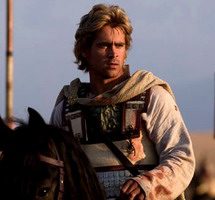Matt Barrett's Greek History!

I clicked on the Alexander bit first, since I was in the mood for a bit of historical gossip considering all the "controversy" in recent months...I met various Greeks in Sydney who personalized the whole issue of Alexander's cinematic sexuality in response to non-Greeks saying things like "Hey, mate! I never knew Alexander was a bloody poofta. It ain't Alexander the Great anymore, is it! It's bloody Alexander the Gay!"
But Greeks in Greece didn't seem to care much at all. I don't get it. Then again, Greeks in Sydney, Australia would never (?) burn an Albanian flag, but Greece Greeks did just the other day.
Anyway, this is what Mr Barret had to say about Alexander the Great.
Sexual attraction between men was considered normal in Classical Greece as well as in Alexander's time. Men of culture and education like Alexander loved beauty, and beauty is beauty whether it is in the form of a woman or a man. Regardless, when Oliver Stone brought the ancient king back to life in his movie Alexander, a group of 25 Greek lawyers threatened to sue him and Warner Brothers for what they claimed was an inaccurate portrayal of history. They were offended by the effeminate nature of Stone's Alexander, as were the critics. They needn't have bothered. The film was a 150 million dollar disaster though from reading reviews and discussing the film I have come to the conclusion that people who know history liked it. People who know movies didn't. The point is that 2000 years later Alexander the Great is still a controversial figure, whether he was man or God, gay or just effeminate. So Alexander still lives. But if he is still 'The Great' why does he need 25 Greek lawyers to defend him? Homosexuality (rather bisexuality) was common place in ancient Greece, but it was regarded as a highest form of human communication, as a sacred bond between men, that lifted them to divine sharing, to refinement of spirit. Philosophers rather than philanderers were born from such relations. This is the issue: not whether you depict Alexander as a homosexual, but how you do it. Jewelry and eyeliner does not do hommage to a kind of relationship that they themselves aspired to be as equal to that of their heroes, Achilles and Patroclus.


